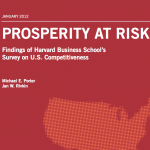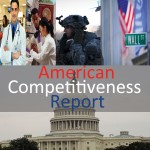
U.S. must include skilled workers in immigration reform
The likelihood of historic immigration reform is increasing by the day.
On Thursday, Politico is reporting the so-called Gang of Eight senators driving the latest legislation expect to have some 70 votes.
For the Obama administration, it would be a significant second-term milestone. For Democratic and Republican lawmakers, it would offer proof to voters that they actually can work together after all on one of the most divisive issues of recent years. To the millions of workers in the country illegally, it is a sort of lifeline that brings people from the political and legal “them” column to the “us” column.
Yet immigration, as a policy or political issue, will not be wrapped up and set aside should this legislation be signed into law.
There remains important work to be done on getting America’s visa system for skilled workers and their families up to the standards of a 21st Century economy. This is not just a matter of addressing the shortfall in STEM workers, which has become a front-burner corporate issue.
See the American Security Project report “American Competitiveness: An Issue of National Security.”
A new approach to immigration policy is an essential part of improving America’s competitive position in the global economy. It is as much about national posture as it is about specific policy. The demand is there.
Take the U.S. quota of 65,000 H-1B visas. It was oversubscribed by nearly two-to-one. The cap was reached within a week, according to the U.S. Citizenship and Immigration Service, while another 20,000 applications were filed by people exempt from the ceiling. The lucky ones are just that — the picks are done by lottery. That is not sound policy.
In the meantime, Canada, among others, is making it easier for foreign high-tech entrepreneurs to work there, according to Bloomberg Businessweek.
Also consider that our universities train some of the world’s finest engineers, scientists and mathematicians. Many are not U.S. born and are forced to leave the country after graduation. Not only is that a poor outcome for a major investment of time and resources, it sends a signal that America does not want to be a destination for the world’s best. That makes it so much easier for our global competitors to welcome these talented workers.
When it comes to American competitiveness, narrative is important. Immigration is a central a theme of the American story. U.S. lawmakers have options for high-skill workers, including the Senate Startup Act 3.0, but have yet to see this through into law. If it is to remain so in the 21st Century, establishing new laws helping millions of undocumented workers become citizens should be the next chapter in America’s growth. But it must also be seen as just the start of something bigger.
Key Links:
Harvard Business School – American Competitiveness
Harvard Business Review Special Edition
HBS Survey on U.S. Competitiveness: Prosperity at Risk
Check out ASP’s White Paper on American Competitiveness that discusses these issues further:
Read our Blogs and Listen to our other podcasts in the series:
Podcasts:
Interview – Norm Augustine: Willpower, patience needed to improve American competitiveness
Interview – Debt ceiling again looms large for states, city government
American Competitiveness – Interview with former Gov. Christine Todd Whitman
Adm. William Fallon (Ret.) on sequestration and American Competitiveness
Sequestration – what’s happening in the States
American Competitiveness and National Security – Podcast
Blog Posts:
Michael Porter: American competitiveness is a foreign policy issue
Look beyond winners and losers in the DoD budget
Event Recap: The UK in the EU and the Future of Transatlantic Cooperation
The STEM Jobs Shortfall Is a National Security Shortcoming We Can Fix
Immigration, American Competitiveness and National Security
Making the case for U.S. leadership in the Pacific
Pentagon – Rare Metals Shortfalls is a National Security Challenge
More Fiscal Focus From The Chairman Of The Joint Chiefs
America’s Long-Term Test: Fusion Power
Moment near for a ‘grand bargain’ on the debt?
Veteran Unemployment and American Competitiveness
Living with uncertainty in the defense industry
Harvard Business School survey finds more pessimism about U.S. competitiveness
Competitiveness – Education: What most schools don’t teach
Sequestration – damage to American competitiveness
Energy R&D Critical to American Competitiveness








[…] U.S. Must Include Skilled Workers in Immigration Reform […]
[…] U.S. must include skilled workers in immigration reform […]
[…] here at the American Security Project believe that immigration reform is an economic and national security issue. The United States is in desperate need to improve […]